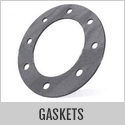 There are many different tasks that call for gaskets. Gaskets are crucial for preventing the leak of fluids or air in a variety of different applications. Since gaskets are available in many different sizes and materials, selecting the right gasket can be a challenging and sometimes overwhelming experience. Below we discuss some tips on how to choose the right gasket for your application needs.
There are many different tasks that call for gaskets. Gaskets are crucial for preventing the leak of fluids or air in a variety of different applications. Since gaskets are available in many different sizes and materials, selecting the right gasket can be a challenging and sometimes overwhelming experience. Below we discuss some tips on how to choose the right gasket for your application needs.
Learn All About the Gasket’s New Environment
Stress relaxation, torque loss on securing bolts, asymmetrical pressures on mating surfaces and extreme temperatures are all factors that contribute to gasket failure. Before you actually choose your gasket for the application, you need to learn every detail about the gasket’s future environment. Details such as temperature, fluid pressure, and the corrosive makeup of the contained fluid are vital to know. Once you have this information, you can now select the proper shape and material.
Material Selection is Key
Now that you have determined the overall environment of where the gasket will be used, material selection is the next step. Below are the common materials used to manufacture gaskets and their benefits.
- Carbon gaskets offer superior sealing even on the worst flange surfaces and can withstand long-term exposure to high temperatures.
- Composite gaskets resist coolant, gasoline, alcohol and oil, and can be easily trimmed for an exact fit on modified parts. Composite generally won’t crush, split, shrink or squeeze.
- Copper gaskets are mainly used on high-performance engines because of their durability. The copper distributes heat evenly throughout the gasket to prevent warping.
- Cork gaskets create a positive seal that eliminates the need for retorquing. They can withstand high-vacuum and high-temperature conditions while maintaining compression.
- Dead-Soft aluminum gaskets are very pliable and provide an excellent seal even on rough, warped, or irregular flange surfaces. The multi-layer, solid aluminum construction is highly resistant to blowout and burnout, and they can be reused.
- Fiber gaskets have a great tensile strength and superior blowout resistance and are also corrosion resistant.
- Graphite gaskets resist heat, preventing gasket burnout. They have excellent compressibility and won’t become brittle.
- Rubber gaskets are easy to install because of their flexibility, and they also have superior heat resistance.
- Steel gaskets are designed to handle higher compression ratios, special cam timing, and higher operating temperatures. The rigid steel design practically eliminates gasket distortion under grueling engine conditions.
Evaluating Chemical Resistance
Prior to selecting from the materials mentioned above, it is key to understand the level of chemical resistance your gasket will require. The corrosive properties of the contained fluid play a major role in your choice. For example, rubbers such as Nitrile are resistant to oil but can’t be used with oxidizing fluids.
Choosing the Right Gasket Manufacturer
The gasket manufacturer you select is the most important selection of them all. Your gasket maker should be there to guide you in gasket selection and offer advice and instruction for your application needs. Rubber Manufacturer and Supply not only has the optimal selection of gaskets for your application needs, it is also home to a knowledgeable and friendly staff who can guide your hand for all of your gasket needs.

